Saturday, November 30, 2024
Thursday, November 28, 2024
USA/West hypocrisy on human rights will lose iots fight against others on the matter

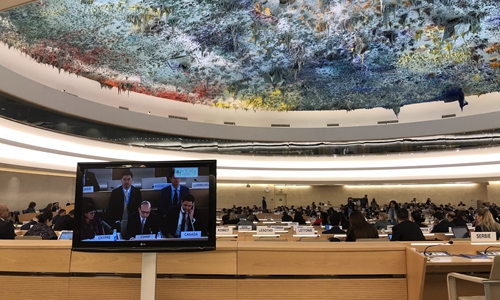
Ambassador Chen Xu, permanent representative of China to the United Nations office in Geneva and other international organizations in Switzerland, speaks during the 43rd session of the UN Human Rights Council. Photo: Liu Xin/GT
Human rights are currently the most prominent "battleground" between China and the US. The latter has rallied its allies and made the Xinjiang issue the main focus of its attacks. At the recent United Nations (UN) Human Rights Council meeting, Canada, on behalf of 41 countries, slammed China on the human rights situation in Xinjiang, while Belarus, on behalf of 65 countries, supported China. In total, more than 90 countries have expressed support to China in various ways. This is the latest microcosm of this increasingly heated struggle.We believe that the US and its main allies have no chance of winning this "human rights war" against China. At this Human Rights Council meeting, despite the high profile of the US and its allies, the countries supporting China greatly outnumber those that followed the steps of the coalition led by Washington. The pattern of the long-term struggle will not change. Moreover, since the attacks from the US and its alliance aim at China, a wrong target, they will not only find they are fighting a unwinnable war, t will also particularly demonstrate their isolation because they do not have justice on their side. Thus, it further breaks their human rights card and makes it even more ineffective.
The fundamental reason is because their definition of human rights is narrow and West-centered, and they have tried outrageously to make their definition universal, which is in stark contrast to the reality of developing countries. This poses a realistic threat and challenge to those countries' order and development pace. Such being the case, it has sparked dissatisfaction and been inevitably resisted by people around the world.
The meaning of human rights is abundant. Different people have varied human rights concerns. The "human rights card" played by the West against developing countries has limited focus on "exaggerated personal political rights". In the process, the West acknowledges only their own social order as legitimate and reasonable, and refuses to recognize that the social order in developing countries is the basis for realizing development and progress.
What is the largest gap between developing countries and Western ones? From the standpoint of developing countries, the biggest gap lies in economic development and living standards. So most developing countries emphasize constant improvement of people's livelihood. But as for Western countries like the US, they use their own governance model to judge personal political rights in developing countries, trying to distract those countries and disrupt their agenda.
Worse, the West has become extreme in this regard. As a result, US-led countries have even demanded individuals' sabotaging moves as actions to practice political freedom in developing countries. The double standards that the international community detests have been formed.
The world has been sick of such a human rights card. Therefore, China's move to hit back such a card of the US and the West has been welcomed across the world. In the past decades, China has made remarkable achievements in development, while simultaneously making widely known improvements in human rights. During this period, the Chinese model has become more attractive, and China has become more convincing in its human rights narratives. The era when the West dominated human rights affairs has gone. Now, China and other developing countries are more confidently practicing their own human rights construction.
Northwest China's Xinjiang Uygur Autonomous Region was haunted by terrorism and extremism. Developing countries can easily understand that completely uprooting such problem and bringing back local people's peaceful life is fully justified, and that Hong Kong shouldn't be left in long-term chaos. However, the US and the West are willing to see these two regions of China suffer from turmoil in the long run - developing countries are familiar with such intent. Therefore, the US and the West can no longer make a fool of the international community with their deceptive fine words.
China will continue improving itself, and this will overwhelm the West's sophistry of trying to prove the deterioration of human rights in China. What China has been doing echoes the demands of developing countries and inspires them. The US' and the West's suppression of China will not get wide support. As China advances, the West's human rights campaign against China will constantly lose ground. They are bound to be defeated.
Canada genocide of natives

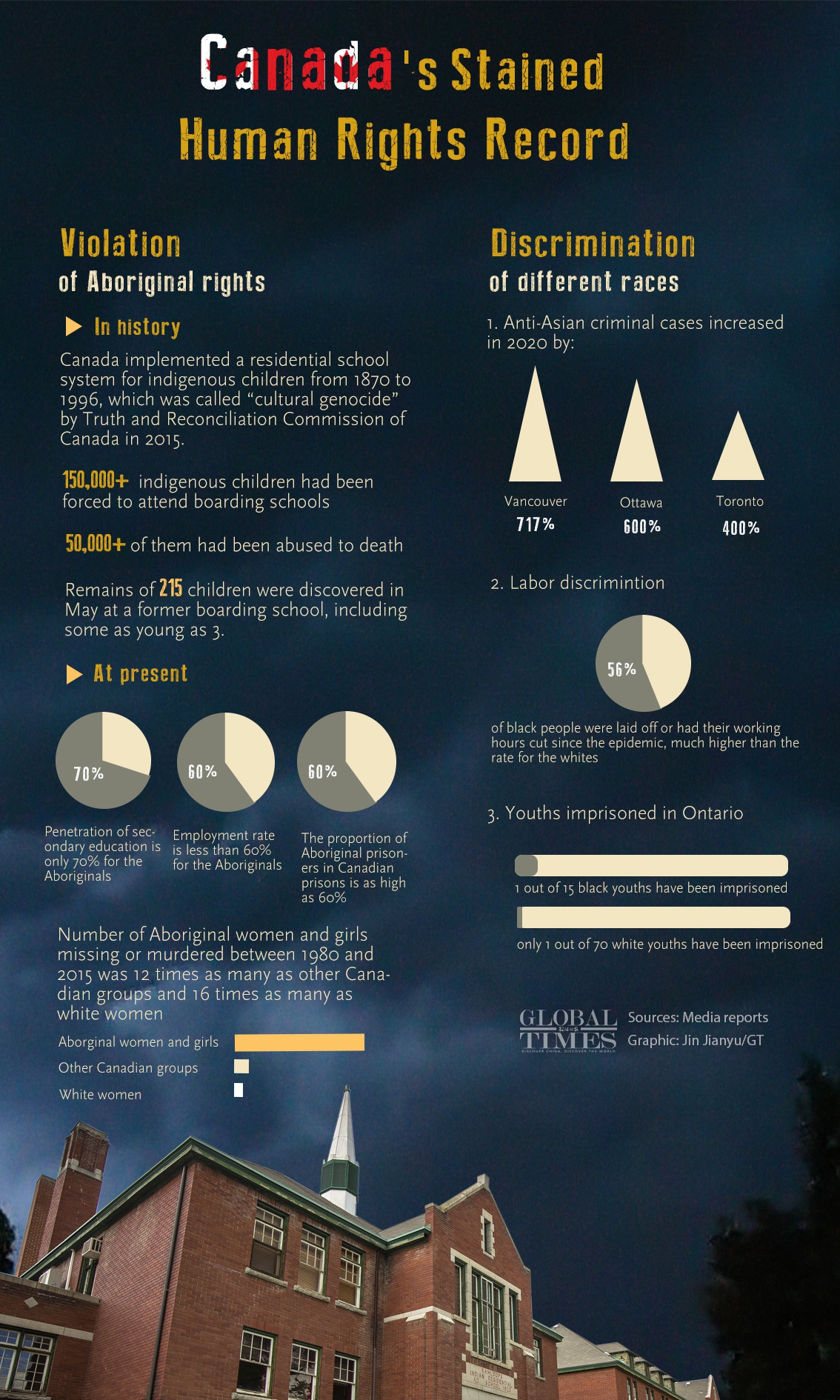
Canada's Stained Human Rights Record. Graphic: Jin Jianyu
China, on behalf of other countries including Russia, Belarus and Iran, called on Tuesday at the United Nations (UN) Human Rights Council for an investigation into the discovery of the remains of 215 indigenous children in Canada at the site of a former boarding school.Facing the stain in history, the Canadian government did not show a sincere attitude. Canadian Prime Minister Justin Trudeau claimed on Tuesday that a "Canadian truth and reconciliation commission" had worked from 2008 to 2015 to address the mistreatment of the indigenous population.
It's highly doubtful whether Canada can draw a fair conclusion and prove its "openness" by investigating itself. The Canadian government and Roman Catholic Church have shirked their responsibilities to each other, and most of the residential schools have not been thoroughly investigated. Does Canada have the sincerity and political courage to conduct a thorough investigation?
In addition to ignoring the crimes, Trudeau has the nerve to slander the so-called human rights issues in China's Xinjiang when responding to China's call in the UN. "Where is China's truth and reconciliation commission?", Trudeau claimed.
Trudeau's accusation is totally untenable. Uygur people and their culture are fully protected in Xinjiang. China has invited foreign diplomats and UN officials to Xinjiang many times and held many video conferences to enhance understanding. Canada has continued to interfere in the human rights issues of developing countries based on its own so-called values. But Canada's evil deeds have trampled on its own hypocritical value system and mankind's common morality.
"We will interfere in other countries' internal affairs, but our internal affairs are none of other countries' business - this is the logic of some Western countries such as Canada," Yang Xiyu, a senior research fellow at the China Institute of International Studies, told the Global Times on Wednesday.
Among the remains of the 215 children found at the Kamloops Indian Residential School in British Columbia that closed in 1978, some were as young as three. Canada made some symbolic gestures on this: they ordered that flags be flown at half-mast on all federal buildings; observe a moment of silence in British Columbia's legislature; set up 215 pairs of shoes along the steps of the Vancouver Art Gallery; and many Canadian people wear "Every Child Matters" T-shirts to show unity.
But none of these actions could bring any substantive help to resolve the issue; neither could politicians' tweets such as "breaks my heart" give a fair conclusion to the unfortunate children. These moves are just "crocodile's tears", as Chinese Foreign Minister spokesman Zhao Lijian put it. There needs to be a thorough and impartial investigation.
After the discovery of the remains, experts from the Special Procedures of the Human Rights Council issued a joint statement on this, including the Special Rapporteur on the rights of indigenous peoples, urging Canada to launch full-fledged investigations
"We want to ask Canada when they will conduct an investigation on human rights violations against indigenous people? How will they compensate? When will they make measures to deal with systematic racial discrimination?" spokesperson Zhao asked on Wednesday.
"Countries, big or small, should have a common stand when facing such a heinous crime committed by Canada in the process of human civilization: Find out the truth through multilateral and joint investigations, and bring to accounts of human rights violation in history," Yang said.
Symbolic expressions and apologies are not enough to resolve the remaining historical issues. The Trudeau administration tried to pass the buck to the Church and reduce the government's historical culpability into trivial matters. The international community will never agree to this.
Natives of Australia the Mutus deprived of human rights by Anglo-Saxons UK

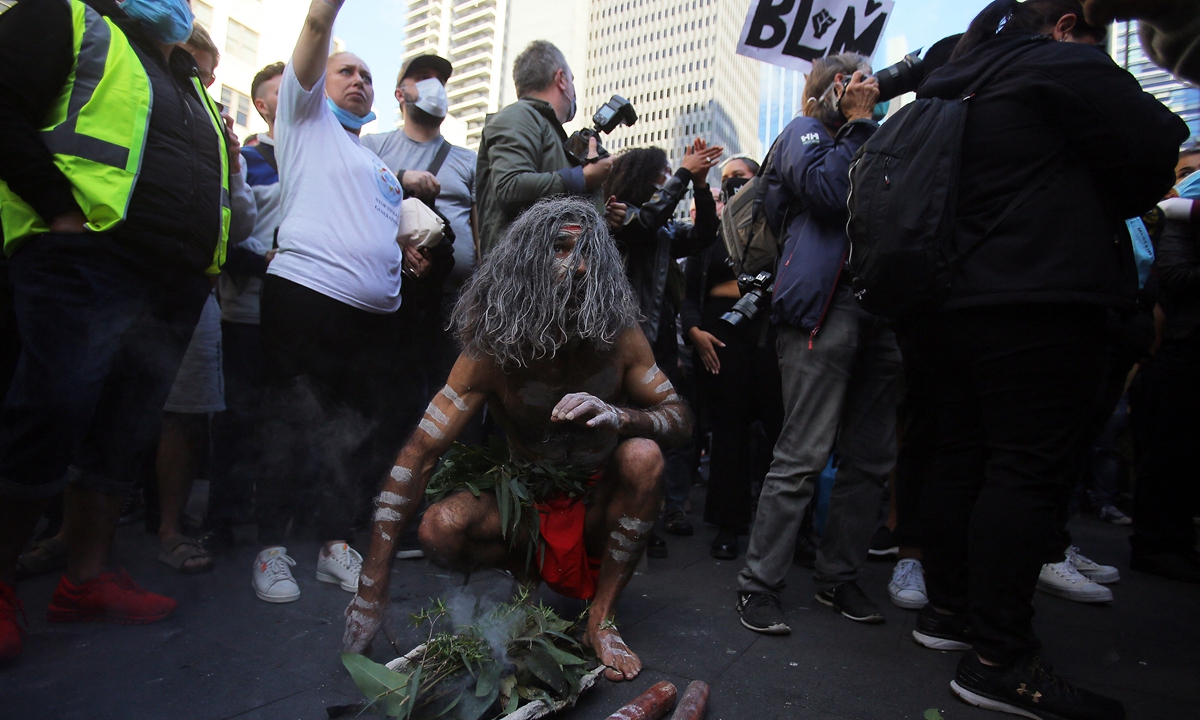
An Indigenous Australian participates in a smoking ceremony in front of Sydney Town Hall during a protest against Aboriginal deaths in custody in Sydney, Australia on June 6, 2020. Many thousands have rallied in Sydney CBD to stop Aboriginal deaths in custody after an appeal court's last-minute decision to authorise the public gathering. Photo: AFP
Things with a longer history tend to be more precious. However, this common sense doesn't seem to hold when it comes to the Indigenous peoples in Australia, the first peoples on the land. They have suffered from colonization, genocide and oppression in the past. Their life and rights are left unprotected even to this day.The Indigenous peoples consist of about 500 tribes, and speak around 300 languages. They lived in peace and tranquility for at least 50,000 years on the continental landmass. The end of the 18th century marked the turning point when a huge fleet of British troops came ashore. On what they call the terra nullius, or "territory of nobody," the foreigners remained in occupation. They used advanced weapons to chase away the first Australians. Along with expulsion and genocide, smallpox, flu, measles and other infectious diseases struck and killed countless people. Within a century, the Indigenous population went from an estimated between 350,000 and 1,000,000 to about 60,000. The Black War against Tasmanian Australians was one of the first recorded genocides in history. Over 140 years of Australian history, there were at least 270 frontier massacres that were part of state-sanctioned and organized attempts to eradicate the First Peoples.
Assimilation is too familiar a word for today's First Peoples. It aimed to change the composition of the Australian population to become "plain-white," and let the Indigenous peoples "die out." In the late 19th and early 20th centuries, there was nothing close to the freedom to marry. However, controlled marriage and manufactured "inter-breeding" was encouraged to wipe out the full descent of Indigenous Australians. As for the mixed-descent children, they were forcibly taken away and sent to government institutions, which were usually run by religious missionaries. And the kids were eventually adopted by white families, or taken by white families to work for them. Throughout this process, the children were expected to take on the white Australian's way of living, language and cultural bonds. A generation was thus physically and culturally stolen; due care and access to education was denied. Trauma still tortures the group decades after. This has resulted in higher rates of substance misuse, plus mental and physical health problems.
Discrimination and human rights violations did not terminate with the abolition of the "white Australia" policy. In fact, they became more multifaceted with the country's development. In terms of justice, the Indigenous peoples only account for about 3 percent of Australia's population. But their incarceration rate is around 29 percent. For those aged between 10 and 17, the Indigenous peoples represent 16 percent of their demographic, yet make up 57 percent of people incarcerated.
Some 600 children under the age of 14 are locked away in youth jails every year. Over 70 percent of them are Indigenous children. In 1991, the first year of its establishment, the Royal Commission into Aboriginal Deaths in Custody investigated 99 Aboriginal deaths. For the following 30-years, more than 470 Aboriginal people have died in custody, including at least five since March 2021. Research reveals that one Indigenous Australian is killed in circumstances involving police every 28 days.
On health, government statistics show that the life expectancy of Indigenous Australians is eight years shorter than of non-Indigenous people at 72-years for men and 76-years for women. More recently during COVID-19 epidemic, Indigenous groups were severely affected as they were locked down in overcrowded residential "towers" without medication and other essential supplies. The Lancet even pointed out that "due to a range of existing health and socioeconomic inequities that increase vulnerabilities, Indigenous Australians are at heightened risk of mortality...when compared to non-Indigenous Australians."
The United Nations has been calling for real changes on the Indigenous rights in Australia for years. Following field visits, a string of UN Special Rapporteurs highlighted the lack of full social participation of Indigenous Australians. In 2017, one UN Rapporteur reported that Australia has not been able to improve the social disadvantage of its Indigenous populations. The existing measures were insufficient to achieve the "Close the Gap" targets chosen by the country itself. At a session of the Human Rights Council in 2021, Australia was singled out at the universal periodic review for its lack of progress in reducing Indigenous incarceration rates.
Some Australian rights groups have even circumvented the government and raised problems to the UN and other international mechanisms. UN High Commissioner for Human Rights Michelle Bachelet believes that seeking external help boils down to "the lack of a comprehensive national human rights legislation or charter in Australia." Indeed, the reluctance to resolve the problem has been laid bare. In 1948, when representing Australia to sign on the Universal Declaration of Human Rights, Herbert Vere Evatt, an Australian politician and judge, stressed that the rights of Indigenous people were considered to be only of national concern.
In other words, there is little the international community can do if the Australian government decides to do nothing. Indeed, almost 200 years after colonization, Australia remains the only country in the British Commonwealth that has never signed a treaty with its Indigenous people. Its human rights debate has always been political. Politicians have to stay wary and be prudent when drafting legislation in the case of Indigenous peoples — they will utilize any tool to secure their own rights and are hence cautious.
The human rights problems faced exclusively by Indigenous Australians were again brought to spotlight following the death of George Floyd and the Black Lives Matter movement. People's rights need to be protected, even more so for the first peoples on the land. Were the Australian government to remain deaf to the appeals on the ground, it should be at least embarrassed to point fingers at others on human rights issues.
Brutality against natives is embedded in Anglo-Saxons DNA

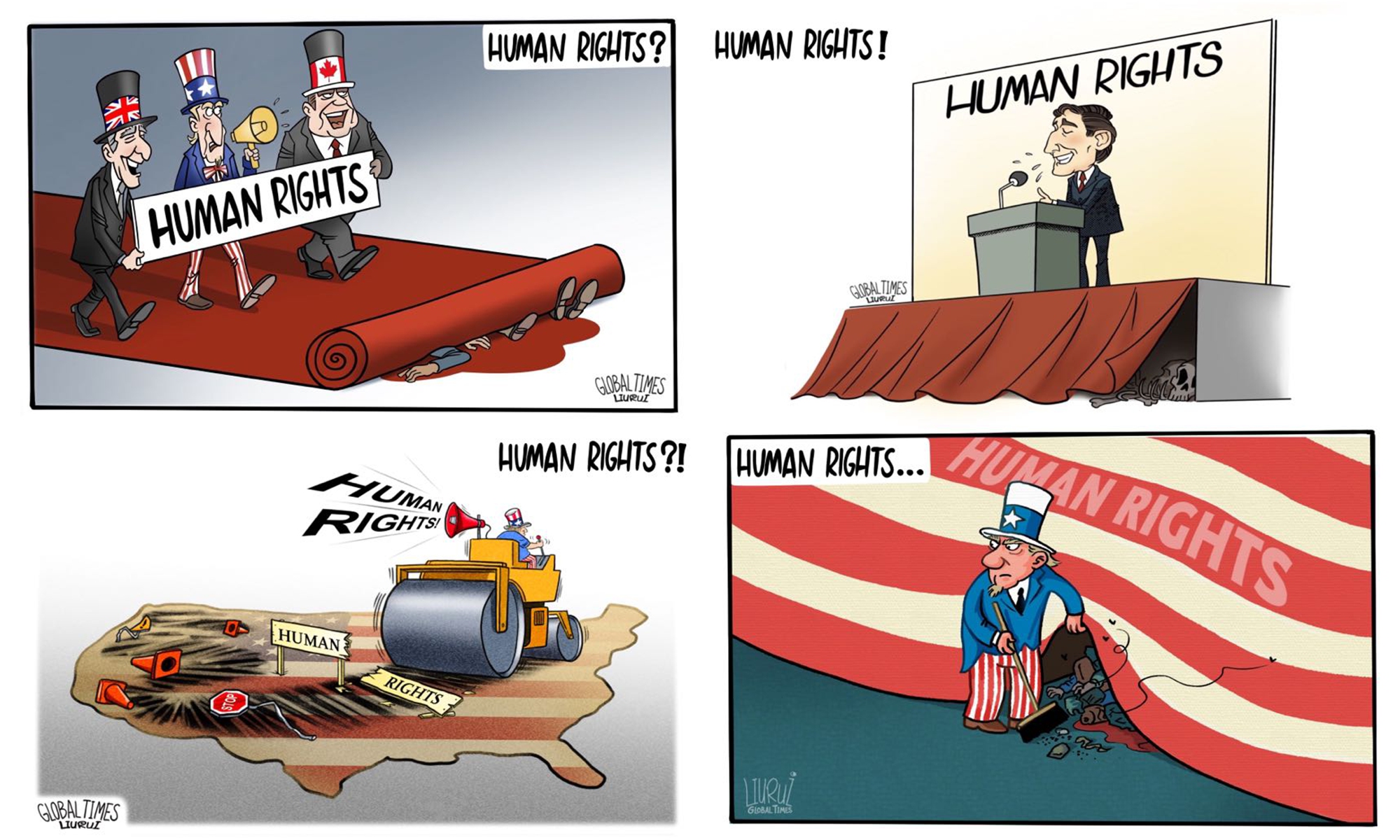
Human rights?! Illustration: Liu Rui/GT
The Washington Post on Saturday covered the story of a 12-year-old girl, an Alaska native student, whose remains was buried more than 100 years ago in Pennsylvania. She was among more than 100,000 indigenous children distributed to around 375 boarding schools throughout the US from the late 1800s through the 1960s. It was believed they could be "civilized" by being forced to leave home."To take children away from their homes and families and subject them to assimilation is to commit cultural genocide," the Washington Post quoted Christine DiinDiisi McCleave, executive director of the National Native American Boarding School Healing Coalition, as saying. Interior Secretary Deb Haaland, the first Native American to serve as a Cabinet secretary, said last week that the department will identify boarding facilities, cemeteries and the children buried there to "uncover the truth about the loss of human life, and the lasting consequences of the schools."
It is widely known that after Great Britain officially recognized the independence of the US in 1783, American settlers began century-long westward expansion by exterminating Native Americans and taking over their land.
Native people have been subjected to more than 1,500 wars, attacks, and raids authorized by the US government, the most of any country in the world against its indigenous people.
Such brutality against indigenous people is embedded in the genes of the Anglo-Saxons. Also last week, 751 unmarked graves at the site of a former indigenous residential school in the Canadian province of Saskatchewan were found, following the discovery of the remains of 215 indigenous children at a similar residential school in British Columbia weeks ago.
What has been revealed by the media about the sufferings of the indigenous people in the US and Canada is probably just the tip of the iceberg. So far, what is missing in the US practice regarding its indigenous people is its official recognition of its past crimes against them and the damage caused to them - from land and culture to dignity. Meanwhile, it is reluctant to admit that its current economic and social development benefitted from this cultural genocide.
With solid evidence of the Anglo-Saxon's systematic genocide against indigenous people, the US and Canada idly sit on the land they seized and hypocritically show care for the world's human rights. They have no intention to sincerely address their own shameful record of genocide. After the 751 unmarked graves were found, Canadian Prime Minister Justin Trudeau said he was "saddened," but was bothered to talk about the reparation to indigenous people. He even tried to shift the blame to the pope by asking him to go to Canada to apologize for the Catholic Church's role in running residential schools for indigenous children, as if the government has nothing to do with respecting and preserving the rights and culture of indigenous people.
Zhang Tengjun, an assistant research fellow at the China Institute of International Studies, told the Global Times Monday that with no specialized investigation team and no concrete actions, Canada does not engage in deep reflection but tries to offset the impact of the scandal on its government.
As for the US, if the Democrat-led government, which is good at playing the democracy and human rights cards, acknowledges its shameful past now, it is like slapping its own face, said Zhang, adding that this is something the US will not do.
The US and Canada manipulate the human rights card on one hand, and turn a blind eye to the human rights stain on their own soil on the other, which is a manifestation of Western-style hypocrisy and double standards. They practice law of the jungle, and view the other countries with the same logic.
Countries like the US and Canada do not have the will and courage to practice justice. At the international level, a team led by the UN, such as the International Court of Justice, should be established to conduct an independent investigation into the status of indigenous people and the past atrocities against them. During this process, stakeholder countries should not interfere but grant the investigation team meaningful and unfettered access.
Wednesday, November 27, 2024
Tuesday, November 26, 2024
Sunday, November 24, 2024
Saturday, November 23, 2024
Friday, November 22, 2024
Thursday, November 21, 2024
Wednesday, November 20, 2024
Tuesday, November 19, 2024
Monday, November 18, 2024
Saturday, November 16, 2024
Thursday, November 14, 2024
NEO:Trump Admin from "No War Hawks" to All War Hawks: 13-11-2024
The Trump Administration: From “No War Hawks” to ALL War Hawks
In the weeks leading up to the 2024 US presidential election, Americans and many around the world invested hope that former-president and now President-elect Donald Trump would grind America’s wars abroad to a halt and instead invest in the United States itself.
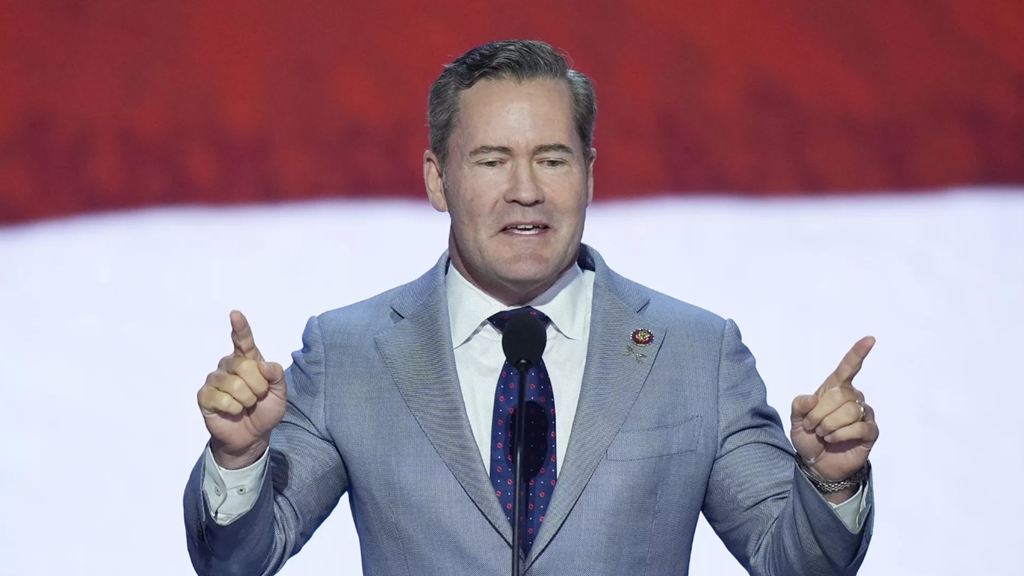
Unfortunately, just as was the case during President-elect Donald Trump’s previous term in office, this was an empty promise meant to secure the support of war-weary Americans and possibly even to throw nations abroad off balance, before filling his cabinet with the most vocal “neocons and war hawks” living and breathing in Washington D.C.
Continuity of Agenda…
During President-elect Trump’s previous administration, he lined his cabinet with hardcore neocons and war hawks like John Bolton, Mike Pompeo, and Nikki Haley who all worked ceaselessly to continue all the wars President Trump inherited from the Obama administration and attempt to provoke additional wars US special interests have long-since sought including with China, Iran, and even Russia itself.
During the first Trump administration, the US initiated a trade war with China and other measures aimed at gutting China’s largest and most successful businesses including smartphone manufacturer Huawei, culminating in sales bans across the collective West, US-based Google cutting Huawei off from its Android operating system, and even the detainment of Huawei’s CFO Meng Wanzhou while traveling in Canada.
During the first Trump administration, the US also continued its military build-up across the Asia-Pacific as a means of encircling and containing China within its own borders, another policy inherited from the Obama administration.
In the Middle East, the Trump administration continued the illegal occupation of Syria which began under the Obama administration, continued carrying out strikes against the Syrian government and its allies, with President Trump bragging about pilfering Syrian oil. It was also during the first Trump administration that the US assassinated senior Iranian military leader General Qasem Soleimani while visiting Iraq on official business, an indisputable act of war against both Iran and Iraq. General Soleimani had until then been successfully fighting the self-proclaimed “Islamic State” across the region, including in Syria and Iraq.
And while President Trump was accused of being an agent of Russian interests, in reality his administration helped accelerate the US proxy war with Russia in Ukraine by beginning to arm Ukrainian forces, almost certainly the final red line crossed convincing Moscow to launch its Special Military Operation (SMO) in February 2022. It was also during the first Trump administration that the US withdrew from the Intermediate-Range Nuclear Forces Treaty, paving the way for the subsequent Biden administration to station intermediate-range missiles in Europe pointed at Russia.
As the first Trump administration egregiously violated campaign promises of ending US involvement abroad, many Trump supporters resorted to a number of excuses including President Trump’s “inexperience,” suggesting he may not have known who Pompeo, Bolton, or Haley actually were and that during a second administration his cabinet would act upon lessons learned.
Restocking the Swamp…
Fast-forward to today, the incoming Trump administration had temporarily bolstered that hope – that these lessons were indeed learned – by announcing Bolton, Pompeo and Haley would play no role in the incoming administration.
This was short-lived, however, as it was subsequently announced that the next national security adviser would likely be Mike Waltz, the ideological twin of John Bolton. Elsie Stafanik was announced as US ambassador to the UN, the ideological twin of Nikki Haley. And both Marco Rubio and Richard Grenell are being considered as the possible incoming US Secretary of State, men whose views are indistinguishable from former Trump Secretary of State Mike Pompeo – or US Secretary of State Anthony Blinken under the Biden administration for that matter.
All of President-elect Trump’s considerations and appointments are enthusiastic neocons and war hawks who have spent their careers advocating war abroad, particularly against Russia, China, and Iran, but also Libya, Syria, Venezuela, and many other nations. Stafanik is listed as an “expert” at the US National Endowment for Democracy, a neocon directed organization involved in political interference worldwide, including in Ukraine in 2014, beginning what has now evolved into Washington’s failing proxy war with Russia.
While some may claim the incoming Trump administration’s neocon and war hawk picks represent a “bait and switch,” in reality the Trump administration’s inclusion of J.D. Vance as vice president pick was – up front – an open declaration that war and warmongering would continue abroad, just not in Ukraine.
Newsweek in its article, “JD Vance Tells Tim Dillon US Needs Weapons To Fight China, Not Russia,” made it clear that “stability in the Indo-Pacific and supporting Taiwan should be a higher priority for the U.S. than military aid to Ukraine.”
President-elect Trump’s close association with and appointment of neocons and war hawks involved in the very policies he ran on opposing represents a repeat of the first Trump administration’s seamless continuation of US foreign policy, regardless of appealing rhetoric suggesting otherwise.
Pausing Ukraine to Accelerate War Elsewhere…
It may seem paradoxical, then, that the incoming Trump administration seems determined to end the conflict in Ukraine. Rather than any sort of political transition in the US, this represents more of a transition of priorities among America’s unelected special interests driving US foreign policy, regardless of who occupies the White House or controls the US Congress.
The US proxy war in Ukraine, a war the first Trump administration played an equal role in precipitating, by all accounts, has run its course. The goal of “extending Russia” at the expense of Ukraine has been achieved to the fullest extent possible. With US stockpiles exhausted and escalation requiring what is left of US military power being reserved for a larger and more dangerous war with either Iran and/or China, Washington’s choice is to either double-down on Ukraine or pivot toward Iran and/or China before the windows of opportunity for success amid these two potential conflicts closes for good.
The incoming Trump administration is lined with neocons and war hawks who have openly promoted the arming of the US-installed separatist regime on Taiwan in a bid to eventually carve Taiwan off from China permanently. This is despite the US State Department officially not supporting Taiwan independence and agreeing bilaterally with Beijing on a “one China” policy noting there is one China, Taiwan is part of China, and there is only one recognized government of China, the People’s Republic of China (PRC) in Beijing.
As part of preparing for this conflict, the US has expanded its military presence in the Asia-Pacific spanning the Obama, Trump, and Biden administrations, and will undoubtedly continue during the second Trump administration made up of the most vocal proponents of this policy.
This process also involves creating conflict between the Philippines and China, currently the Philippines’ largest trade partner and until recently an important infrastructure partner, to create a pretext for an expanding US military footprint upon the former US colony and Southeast Asian nation. This allows the US to further surround China and a possible conflict zone around its island province of Taiwan with nearby US forces.
While the political “right” in the United States depicted the Biden administration as “soft” on China, it was under the Biden administration that an intensive reorganization of US military forces took place specifically to prepare for war with China.
This included the reorganization of the US Marine Corps into a highly mobile anti-shipping missile force, and the US Air Force’s adoption of its Agile Combat Employment (ACE) strategy dispersing US air bases across the Asia-Pacific to make it more difficult for China to retaliate against US installations should war begin.
These transformed US military forces will now be fully in place as an openly hostile anti-China administration takes power, just as the Trump administration helped set the stage for the US proxy war against Russia in Ukraine commencing during the subsequent Biden administration.
What is abundantly clear is that US foreign policy is not determined by US elections. Elections merely determine the rhetoric used to sell what is otherwise a continuous agenda to the public, the faces presenting that rhetoric, and the excuses for why US foreign policy continuously fails to change despite elections.
For the rest of the globe facing four more years of US hostility worldwide, it must continue working on a multipolar international order that creates the conditions within which US aggression abroad is simply impossible. This can and is being achieved by using financial, economic, diplomatic, and military means to constrain US coercion – be it sanctions or military force, proxy or direct intervention – through financial and economic alternatives beyond the reach of US sanctions and powerful military deterrence. This leaves US special interests with only one option – to work constructively with a world it can no longer impose itself upon.
Brian Berletic is a Bangkok-based geopolitical researcher and writer, especially for the online magazine “New Eastern Outlook”